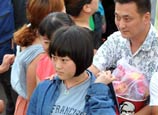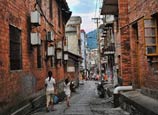
BEIJING, July 13 (Xinhua) -- The Old Summer Palace, an ancient royal garden that was nearly destroyed by British and French troops 150 years ago, is experiencing yet another change.
The core area of the Old Summer Palace, or "Yuanmingyuan" in Chinese, is undergoing renovations and repairs. However, experts from the Society of Yuanmingyuan believe the repair project is doing more harm than good.
The ruins of the palace are among 150 sites designated to be protected and repaired under a plan issued by the State Administration of Cultural Heritage on July 3.
Local residents who were growing crops in some areas of the ruins were evicted in 2008. Their farmlands slowly turned back into grasslands.
"At that time, the farmers only worked on the surface of the land, while the underground ruins remained. The landscape in the northwestern part of the palace was well-preserved," said Yao Limin, deputy general-secretary of the Society of Yuanmingyuan.
"But now, excavators have rolled over the ruins," said society member Ma Zhixin, who gave reporters a tour of the area a week ago.
Ma has visited the palace dozens of times, taking many photos to document its appearance.
"Rocks were dug out and moved away here. No one came to take care of them," Ma said while pointing to the bank of a river in the northwestern part of the palace.
Although construction workers told Ma that they would rearrange the rocks in a more aesthetically pleasing fashion, they have yet to do so.
The renovation is being done out of historical reasons, said Zhang Guobin, deputy director of the Yuanmingyuan Administration, which is in charge of cultural relic protection work at the palace.
"Farmers worked and lived here. Cleaning up the palace and draining the river watercourses demands heavy machinery, but the renovation is being done under the supervision of experts in order to avoid damaging the ruins," he said.
Zhang Guobin said the project is part of greater environmental remediation efforts that were approved by the State Administration of Cultural Heritage in 2004.
The construction is being completed by Beijing Xinxing Jianyu Construction Engineering Co., Ltd., while the experts guiding the construction efforts are from the School of Archaeology and Museology of Peking University, Zhang Guobin said.
The palace's environmental remediation could be classified as a protection project, said Zhang Lei, deputy director of the Archaeology Department of the State Administration of Cultural Heritage.
The approval given by the State Administration of Cultural Heritage in 2004 is an approval in principle, but the responsibility of examining specific projects falls to the Beijing Municipal Bureau of Cultural Heritage, Zhang Lei said.
"If the original proposal was not changed, the approval is legally valid," Zhang Lei said.
Zhang Guobin responded that the proposal had not been changed. "No cultural relics have been touched. All of the areas inside the palace are classified as ancient ruins and any change that affects cultural relics requires approval from superior authorities," he said.
The question, then, is to define what constitutes "cultural relics" in Yuanmingyuan.
According to China's Law on the Protection of Cultural Relics, "sites of ancient culture...that are of historical, artistic or scientific value" can be defined as cultural relics.
The Beijing government asked governmental departments and experts to create a plan for developing the park in 1999. The plan was approved by the State Administration of Cultural Heritage in 2000 and is considered to be the defining document in protecting and utilizing the ruins.
The plan defines all architectural ruins, waterways, rock formations and plants inside the palace as cultural relics that require protection.
"One opinion says that all the waterways, rock formations and plants are cultural relics, which is a broad definition. In fact, in a more narrow sense, 'cultural relics' refers to actual carriers," Zhang Guobin said.
Using heavy machinery to repair the ruins is not prudent, as the machinery could damage the landscape, said Cao Xin, an associate professor at the Landscape Architecture School at Beijing Forestry University.
Cao said she visited the construction area in fall 2012.
"The landscape of Yuanmingyuan was not naturally born, but created through manual work. The hills and waterways were imitations of nature, which made Yuanmingyuan a model of gardening, as well as a model of ancient Chinese garden design," Cao said.
"We have seen the construction site. It is not right to treat an important site this way. Have the machines damaged the roadbed or river revetments? We hope the administration can provide evidence," she said.
Photographer Feng Fangyu said he believes he is one of the last people to see the northwestern ruins in their original state. He has taken photographs of the area since 2009.
"I went to the site last year. They laid down waterpipes and electrical circuits. Rocks were moved away and replaced. The design is too modern; they've turned it into an ordinary park," Feng said.
Ma said many of the palace's scenic viewing areas have been affected by excavators, adding that new rocks and trees have changed the way the palace looks.
"The plants weren't chosen in a historically accurate manner, which makes the ancient garden look like a modern park," Ma said.
Waterways that were once interconnected have been cut off from each other, with some smaller rivers drying up completely.
"New bridges that didn't exist in previous periods have been built over the river," Ma said, pointing at a map dating back to 1933.
"All of the road and bridge construction is reversible. The construction was launched after archaeological exploration and is being done in a way that avoids the ruins, as the main principle is to avoid disturbing the ruins," Zhang Guobin said.
"Cutting off the river is a temporary measure, as land in the west part of the palace is higher in elevation that that of the eastern palace. After the project is completed, we will consider rebuilding the water network according to the situation," Zhang Guobin said.
"In fact, Yuanmingyuan had been developing and changing since the beginning. There is no absolute shape for the palace. The landscape and plants change in accordance with historical trends," he said.
Yao said today's Yuanmingyuan is not the Yuanmingyuan of years past.
"It still needs to be protected after being razed in 1860," she said.
Yao said experts from the Society of Yuanmingyuan have often argued about how to deal with the palace, with some in favor of environmental remediation and others arguing that the ruins should remain as-is.
However, both sides oppose the current renovation efforts, Yao said.
"The plan created in 2000 defined Yuanmingyuan as a ruins park. The ruins represent the majority of Yuanmingyuan. Protection is a precondition for repair and utilization," Zhang Guobin said.
















 Migrant workes' high incomes not that rosy
Migrant workes' high incomes not that rosy


![]()
